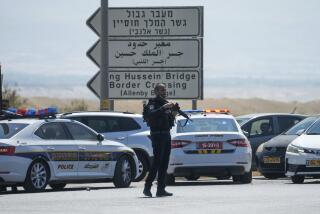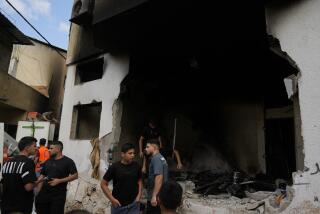Israeli troops on high alert as violent protests continue in Jerusalem
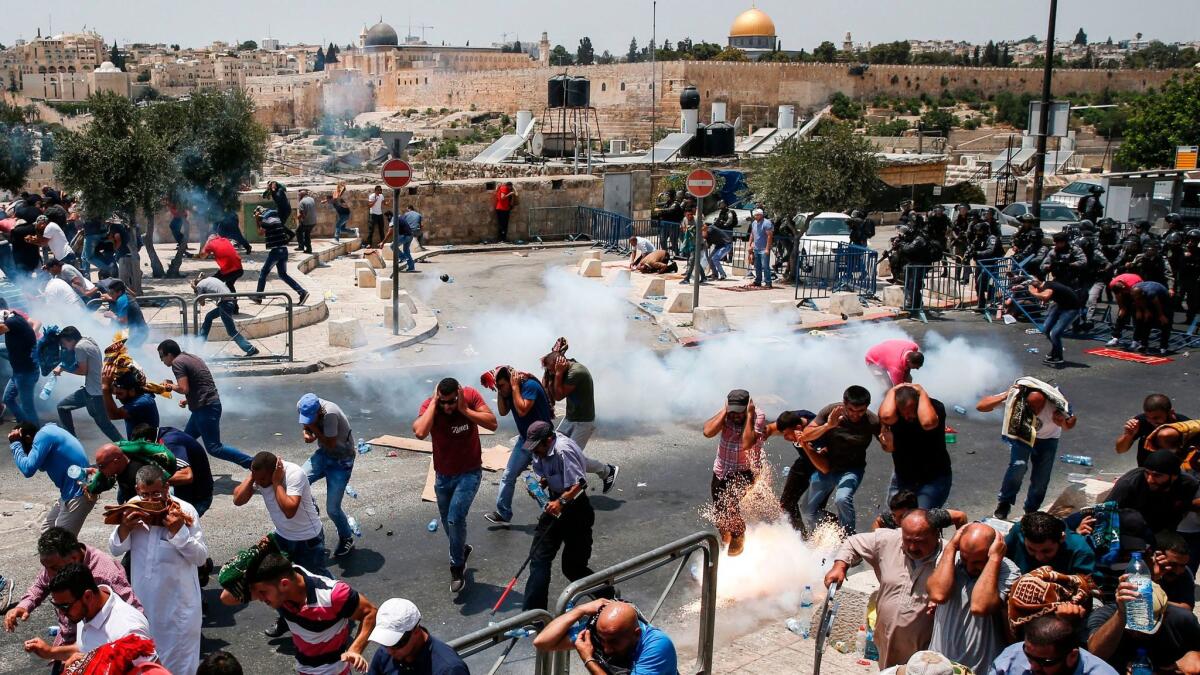
East Jerusalem continued to smolder Saturday after one of the worst days of Israeli-Palestinian unrest in years. Masked youths clashed with riot police on streets littered with stones hurled by rioters and shops were shuttered to protest violence that left three Palestinians dead the day before and at least one more on Saturday evening.
Israel, meanwhile, identified the victims of a stabbing attack in the settlement of Halamish as 70-year-old Yosef Salomon, and his children, Chaya, 46, and Elad, 36. The three were killed by 19-year-old Omer Abed, who sneaked into the settlement and burst into a family dinner at the start of the Jewish sabbath Friday evening.
“This was an act of terrorism committed by a beast incited by wild hatred,” Prime Minister Benjamin Netanyahu’s office said in a statement Saturday night.
The casualties on both sides were fallout from an escalating dispute over Israel’s placement of metal detectors at the entrance to a complex that includes Al Aqsa Mosque, touching off a political crisis and violence that some fear might morph into a prolonged uprising against Israel.
Palestinians returned to the Lions Gate outside Jerusalem’s Old City to worship and demonstrate against Israel’s deployment of metal detectors outside a plaza holy to Muslim and Jews. Israeli police barricades kept men about a football field away from the outer wall of the Old City, and dozens of men and women loitered waiting for evening prayers while children passed out water bottles and pastries.
With a green-and-yellow prayer rug draped over his shoulder, Khalil Yassin pulled back his sleeves to reveal black and blue marks that he said were inflicted by police during Friday’s clashes.
“Yesterday, they kicked me,” said the 21-year-old building worker. “I’m coming here every day — and every day our numbers are increasing. We are not scared of anything. I only want to go to the mosque and pray.”
Standing along with two other young men, Yassin insisted that the demonstrations would go on for weeks until the removal of the metal detectors, which he claimed are an imposition on worshipers and intrusive for female worshipers.
But Palestinians also say the metal detectors represent a unilateral move by Israel to assert its sovereignty at the sacred complex, known to Jews as the Temple Mount and to Muslims as the Noble Sanctuary, and curtail Muslim worship. Palestinians say they fear Israel’s government will bow to demands by Israeli right-wingers to revoke a ban on Jewish prayer at the site. They fear they will have to share the esplanade with Jewish worshipers, just as they share the Tomb of the Patriarchs holy site in the West Bank City of Hebron.
“As long as Aqsa is besieged, our young men will not move from outside the gate,” said Mahmoud abu Ghanem, whose nephew, Mohammed, was shot dead Friday by Israeli police amid a crowd of stone-throwing youths in the Mount of Olives neighborhood.
Abu Ghanem was sitting at a mourning tent outside the family’s house in East Jerusalem, as hundreds of mourners paid respects to the family and a cleric delivered an incendiary sermon over the explosions of firecrackers just a few blocks away.
“These bursts are boosting the morale of youth,” Sheik Ahmed Amra said over a loudspeaker. “Congratulations to the family of the martyr. Your son died for Al Aqsa.”
The uncle agreed. “It is worth it for Mohammed to be a martyr. We should all be martyrs. As long as Al Aqsa is besieged, nothing will calm down.”
Just a few minutes’ drive away in the predominantly Jewish neighborhood of French Hill, the clashes seemed far away. Two Israeli sisters waiting to catch a bus said they were not scared by the unrest in the city, but expressed hope that both sides figure a way to defuse tensions.
“I don’t feel the tension. I feel safe in this neighborhood,’’ said Miri Lupovich, 28. “The government needs to lower the flames. The metal detectors aren’t the problem. Both sides are exploiting this to their own political advantage.”
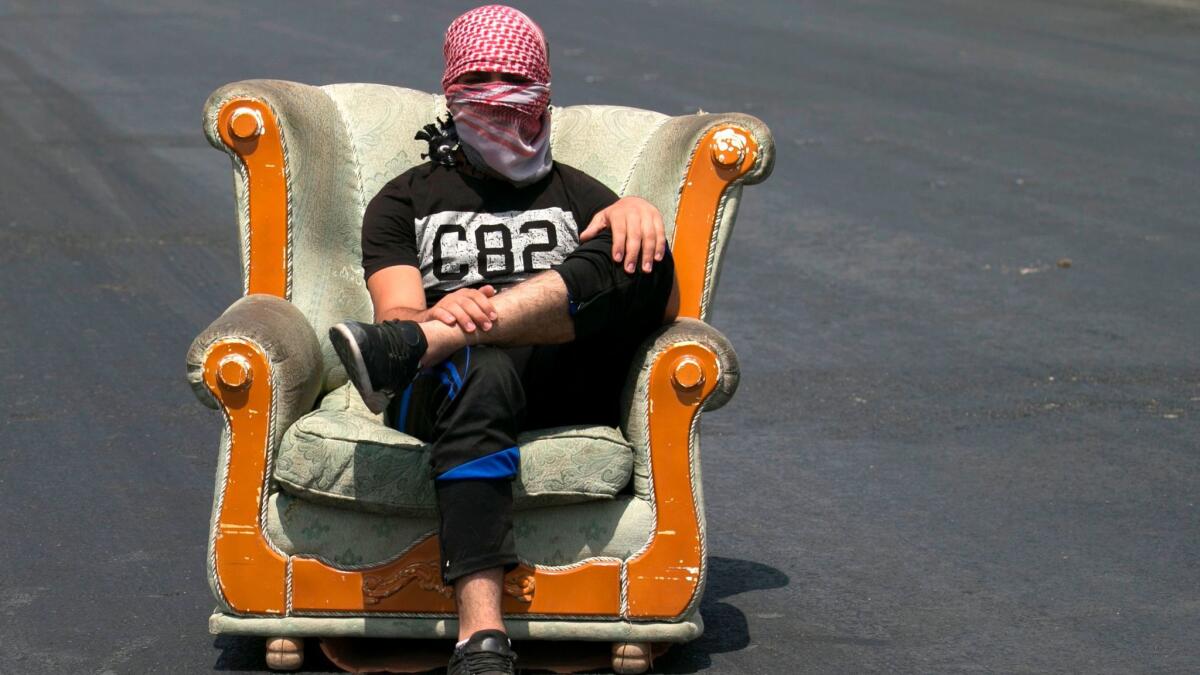
Israeli officials said the metal detectors became necessary after three gunmen ambushed and killed two policemen guarding the Jerusalem holy site. They accuse the Palestinians of whipping up religious sentiment over the metal detectors and Al Aqsa, and insist that anyone who wants to worship there can do so.
“No one’s right to pray on the Temple Mount is being violated. The inspections for dangerous materials are being conducted respectfully,” said Michael Oren, a deputy minister in Netanyahu’s government, in a conference call with reporters. “The Waqf and [the militant group] Hamas have transformed this self-defense mechanism into a religious offense.” The Waqf is Jordan’s Islamic authority that manages the Jerusalem holy site.
The Palestinian fatality on Saturday occurred amid clashes with security forces in the West Bank town of Azariya, just east of Jerusalem’s border, according to the Palestinian Red Crescent Society. A spokeswoman for the Israeli army denied soldiers were responsible, and said the Palestinian died when a homemade explosive accidentally detonated.
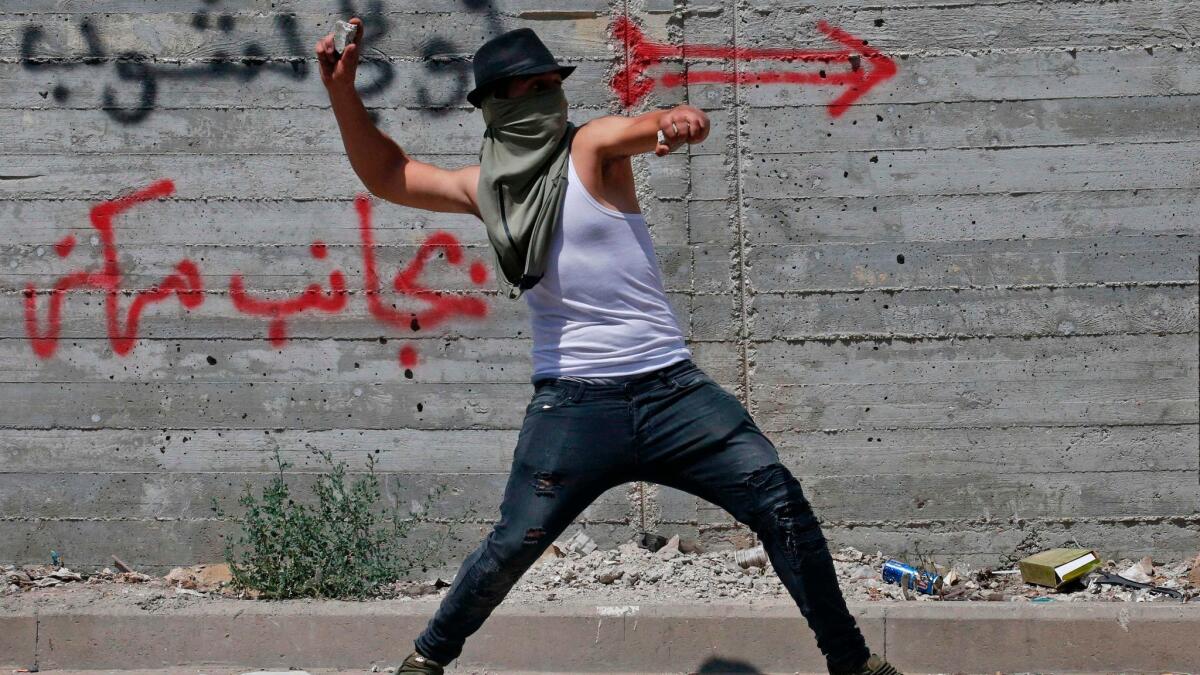
Teams of Israeli border police set up at the main intersections in the hillside neighborhoods to the east of the Old City. Some roads to the Old City were blocked. At dusk, a burst of stun grenades and clouds of tear gas went off amid evening prayers at the Lions Gate. Streets that had been clogged with cars en route to the prayers turned into empty no man’s land as the night’s clashes got underway.
Standing in front of shuttered shops just a few feet from a group of border police, Wissam Sayyad said he had stayed home from work for the last week. No one was working, he said.
“The mood is demoralizing. It’s oppressive,” he said. The 28-year-old gardener accused Arab governments and Palestinian Authority President Mahmoud Abbas of ignoring the situation at the Muslim holy sites. “No one here is supporting Al Aqsa. Abbas isn’t supporting Aqsa and the Arab countries aren’t. We are the only ones.”
Mitnick is a special correspondent.
More to Read
Sign up for Essential California
The most important California stories and recommendations in your inbox every morning.
You may occasionally receive promotional content from the Los Angeles Times.
